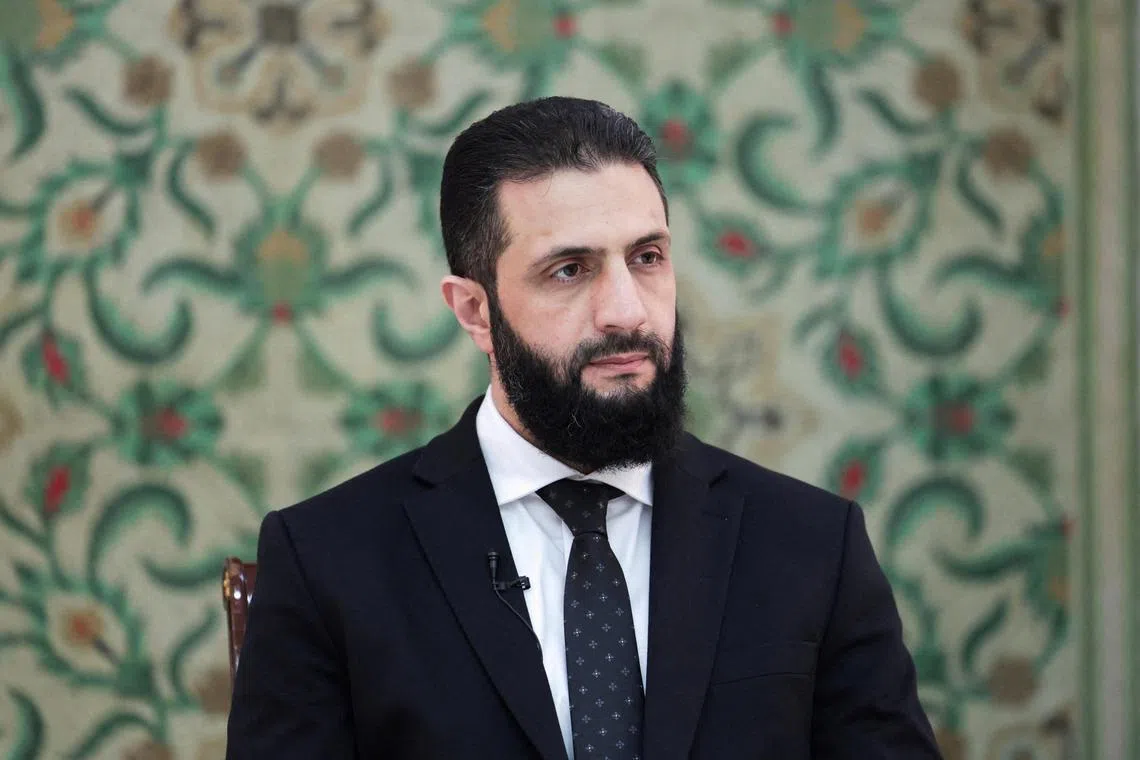Syria reboots interior ministry as Damascus seeks to reassure West
Sign up now: Get ST's newsletters delivered to your inbox

US President Donald Trump said he wanted to give Syria’s new rulers – led by interim President Ahmed al-Sharaa (above) – a "chance at greatness”.
PHOTO: REUTERS
DAMASCUS – The Syrian authorities on May 24 announced an interior ministry restructuring that includes fighting cross-border drug and people smuggling as they seek to improve ties with Western nations that have lifted sanctions.
Keen to reboot and rebuild nearly 14 years after a devastating civil war broke out, the new authorities in Damascus have hailed Washington’s lifting of US sanctions.
The move was formalised on May 23 after being announced by US President Donald Trump on a Gulf tour in May during which he shook hands with Syria’s militant-turned-interim-president Ahmed al-Sharaa.
Spokesman Noureddine al-Baba said the interior ministry restructuring included reforms and creating “a modern civil security institution that adopts transparency and respects international human rights standards”.
It includes setting up a citizens’ complaints department, and incorporating the police and General Security agency into an Internal Security command, he told a press conference.
A border security body for Syria’s land and sea frontiers will be tasked with “combating illegal activities, particularly drug and human smuggling networks”, Mr Baba said.
The restructure includes “strengthening the role of the anti-drug department and further developing its importance within Syria and abroad” after the country became a major exporter of illicit stimulant Captagon, he added.
Another department will handle security for government facilities and foreign missions, as embassies reopen in Syria following Dr Bashar al-Assad’s ouster
A tourism police body will secure visitors and sites as the war-torn country – home to renowned Unesco World Heritage sites – seeks to relaunch tourism.
‘Of critical importance’
Syria’s foreign ministry welcomed Washington’s lifting of sanctions, calling the move “a positive step in the right direction to reduce humanitarian and economic struggles in the country”.
Turkish foreign ministry spokesman Oncu Keceli said the recent US and European Union steps to lift sanctions were “of critical importance in efforts to bring stability and security to Syria”.
The EU announced the lifting of its economic sanctions on Syria
Mr Sharaa met Turkish President Recep Tayyip Erdogan on May 24 on his third visit to Turkey
Ankara is a major backer of Syria’s new authorities, who are negotiating with Kurdish forces that control swathes of the north-east and whom Turkey considers “terrorists”.

Turkish President Recep Tayyip Erdogan welcoming Syrian President Ahmed al-Sharaa (left) to Istanbul on May 24.
PHOTO: AFP
A government delegation made a first visit on May 24 to the notorious Al-Hol camp in the north-east that hosts families of suspected Islamic State group militants.
Mr Trump said he wanted to give Syria’s new rulers “a chance at greatness” after their overthrow of Dr Assad.
While in Istanbul, Mr Sharaa met with the US ambassador to Turkey, who doubles as Washington’s Syria envoy. In a statement, Mr Tom Barrack said: “President Trump’s goal is to enable the new government to create the conditions for the Syrian people to not only survive but thrive.”
He added that it would aid Washington’s “primary objective” of ensuring the “enduring defeat” of Islamic State.
US sanctions were first imposed on Syria in 1979 under the rule of Dr Assad’s father, Hafez.
They were sharply expanded after the bloody repression of anti-government protests in 2011 triggered Syria’s civil war.
The new administration has been looking to build relations with the West and roll back sanctions, but some governments expressed reluctance, pointing to the Islamist past of leading figures.
‘Recovery and reconstruction’
The sanction relief extends to the new government on the condition that Syria does not provide safe haven for terrorist organisations, and ensures security for religious and ethnic minorities, the US Treasury Department said.
Concurrently, the US State Department issued a 180-day waiver for the Caesar Act to make sure that sanctions do not obstruct foreign investment in Syria.
The 2020 legislation severely sanctioned any entity or company cooperating with the now ousted government.
US Secretary of State Marco Rubio said the waiver would “facilitate the provision of electricity, energy, water and sanitation, and enable a more effective humanitarian response across Syria”.
However, Mr Rubio cautioned that Mr Trump “has made clear his expectation that relief will be followed by prompt action by the Syrian government on important policy priorities”.
He said lifting the sanctions aims to promote “recovery and reconstruction efforts”.
Syria’s 14-year civil war killed more than half a million people and ravaged its infrastructure.
The interior ministry’s spokesman said around a third of the population had been under suspicion by the Assad government’s feared intelligence and security services.
Analysts say a full lifting of sanctions may take time, as some US restrictions are acts that need to be reversed by Congress.
The Syrian authorities also need to ensure an attractive environment for foreign investment. AFP

Syrian President Ahmed al-Sharaa speaking at a joint press conference with French President Emmanuel Macron during a visit to Paris on May 7.
PHOTO: REUTERS


